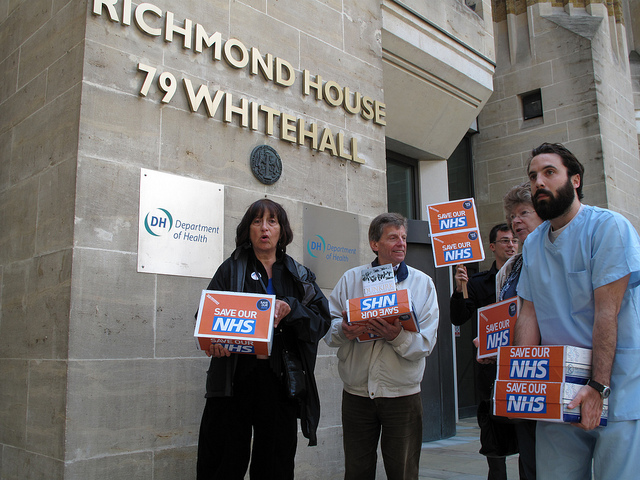Governing public services in England and Wales: a move from the stakeholder model could further the democratic deficit
A great deal of attention is given to roles of both Chief Executives and members of the Senior Management Team in many organisations, yet the work of the governing board is frequently neglected. Comparing England and Wales, Jacqueline Baxter and Catherine Farrell argue that we’re witnessing a shift away from the predominantly stakeholder model of board membership, which could potentially further the ‘democratic deficit’ in the governance of public services.

Credit: 38 Degrees, CC BY 2.0
Entrepreneurship and democratic deficit
There is little doubt that public services in the UK and internationally are facing unprecedented challenge, not only in terms of how they are governed and led, but equally in terms of how far they represent and respond to stakeholder needs. Government emphasis on innovation, transformational leadership and the introduction of new entrepreneurial approaches – many of which mirror private sector strategy, are creating unprecedented challenges for governing boards and their executives. These complexities, combined with the need for governance to be responsive and pro-active, have led the UK government to place a great deal of emphasis on policies which look to increase skill sets on boards whilst also making them ‘appear’ and act in ways that are more responsive to stakeholders.
Officially, it falls to the board to lead and set the strategy for the organisation and the service, and set parameters for the overall operation of the organisation. Often called the governing board, the board of trustees, the governing body, the authority or just the ‘board’, members are charged with leadership, strategy and monitoring activities to ensure that the organisation is working towards its mission.
Looking more closely at four services across England and Wales: health, fire and rescue, education, and policing, it is clear that a number of changes have taken place since 2010. In Wales, these changes are less marked in the devolved services of health, education and fire, and rescue than in the services of their counterparts in England. In terms of policing, clearly the big shift has been to the elected model of governance.
A tale of four services: policing, fire and rescue, education, and health
A great deal of research focuses on the ‘democratic deficit’ and ways in which public participation in every area of public life is apparently on the wane. It highlights that there is a deficit and it is articulated in myriad of forms, including voter disengagement, variation in volunteer levels and a move towards populist and radical right parties and a rejection of the kind of democratic public participation seen in the era of post-war consensus. So too the rise of neoliberal modes of thought and the popularity of ‘command and control’ deliverology policies based on targets and performance measurement, combined with increasingly harsh regulatory regimes to create high risk environments for public service organisations. From this, an emphasis on ‘professional skills’, particularly those from the business world, has assumed primacy in the recruitment strategies of boards in English education.
The Welsh education system has not been subject to the same radical policies as its English counterpart and its model of school governance continues to combine an emphasis on skills with equal stress on the importance of stakeholder representation. This is in contrast to England where independent academies and increasing numbers of federated schools (more than one school governed by the same board), have placed pressures on boards to operate at a high level in a high stakes environment. Similar patterns are replicated in health which was devolved in Wales from 2003. Although the English model was originally established to increase public participation and stakeholder engagement, there are only two lay members on Clinical Care Commissioning groups and these are largely there due to their professional skills in areas, for example, accounting, HR or other specialism.
In the case of police, there has been a marked contrast in the ways in which they are governed since the system of elected Police and Crime Commissioners was introduced. Although the system was premised on the need for ‘greater transparency’ and ‘responsiveness to local issues’, the practice has revealed that it isfar from democratic. There are several main reasons for this: lack of representation of women and ethnic groups; weak legislative powers of the panel set up to hold Commissioners to account; and very poor voter turnout at the 2012 elections.
If government plans go ahead there may also be divergence in the governance of the fire and rescue service in England and Wales. Currently, the service is governed by an authority which is stakeholder focused and made up of a number of elected members. In England, if government proposals go ahead, the service would be brought under the auspices of Police and Crime Commissioners despite the not inconsiderable issues with the present model and no evidence that the 2016 elections will provoke more public participation than the last. There are no plans for the model to be adopted in Wales though there may be a review of the governance of the service.
There is little doubt that we are witnessing a shift away from predominantly stakeholder model of board membership to appointed or elected models of governance. This is particularly relevant in England where sweeping legislative changes have made board governance a high risk activity – when boards fail the mediaare swift to apportion blame, exemplified by a number of recent cases.
Shifting governance has important implications for accountability and scrutiny and raises questions around who actually owns our public services. The government emphasis on choice and cost effectiveness is giving rise to more public-private partnerships, outsourcing and increasing levels of commissioning are creating complex multi-level systems of governance which demand skilled and practiced board members. The same challenges are also making regulation of such organisations and their governance highly complex, increasing the likelihood of error or board failure.
Although the merits of professionalizing boards are clear, there are democratic downsides – the FTSE 100project exemplifies some of the challenges of ensuring adequate representation on ‘professional boards’ particularly in terms of women, ethnicity and disability. There is no reason why public sector boards which adopt similar professional models of governance should not experience similar problems and there is ample evidence that they do. In addition to this, appointed and elected trustees, or governors, means that fewer people are involved in key decisions within services with the risk of ‘squeezing out’ community and wider stakeholder interests. There are also considerable issues with investing huge power in the elected model of governance as these individuals have gained their roles with little democratic involvement from the electorate.
Public service governance in England and Wales is undergoing change, and what these changes will bring in the longer term is yet uncertain. What is certain is that the tensions between functionality and effectiveness and democratic representativeness of public services in both countries is increasingly apparent and the long term effects of the diminution of the stakeholder model can only said to be contributing to the ‘democratic deficit’ that places citizen representation and governance in an increasingly invidious position.
—
Note: The article represents the views of the author and not those of Democratic Audit or the LSE. Please read our comments policy before posting.
—
 Jacqueline Baxter, is a Lecturer in Public Policy and Management at the Open University. Her academic profile can be found here.
Jacqueline Baxter, is a Lecturer in Public Policy and Management at the Open University. Her academic profile can be found here.
 Catherine Farrell is Professor of Public Management at the University of South Wales. Her academic profile can be found here.
Catherine Farrell is Professor of Public Management at the University of South Wales. Her academic profile can be found here.





 Democratic Audit's core funding is provided by the Joseph Rowntree Charitable Trust. Additional funding is provided by the London School of Economics.
Democratic Audit's core funding is provided by the Joseph Rowntree Charitable Trust. Additional funding is provided by the London School of Economics.
Governing public services in England & Wales: a move from the stakeholder model could further the democratic deficit https://t.co/WUCFSwpKhp
Governing public services in England & Wales: a move from the stakeholder model could further the democratic deficit https://t.co/JoCW1GDmys
Governing public services in England & Wales: a move from the stakeholder model could further the democratic deficit https://t.co/v1M9nX7Q7e
Governing public services in England and Wales: a move from the stakeholder model could further the democratic def… https://t.co/YhE2XkS7Fn
Governing public services in England and Wales: Junking the stakeholder model could further the democratic deficit https://t.co/DiFvQref6S
Governing public services in England and Wales: a move from the stakeholder model could further… https://t.co/EW7Zy7G7Wx
Governing public services in England & Wales: moving from the stakeholder model may grow the democratic deficit https://t.co/DiFvQref6S
Governing public services in England and Wales: a move from the stakeholder model could… https://t.co/KydoWaSFQL https://t.co/89tcGSC1Vj